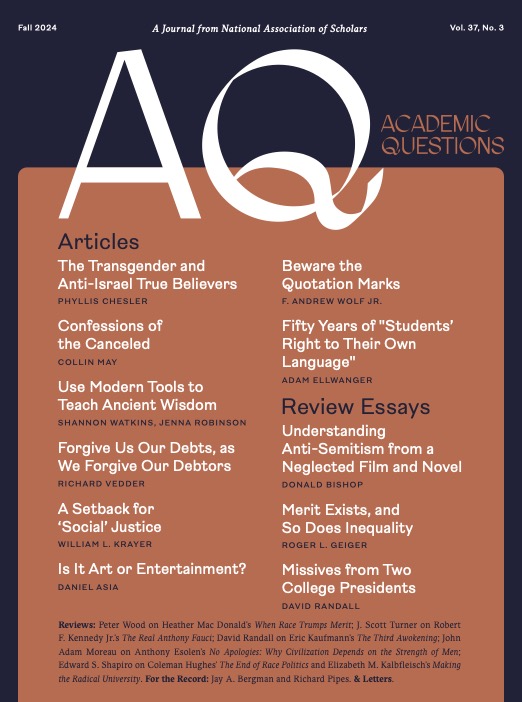ARTICLES
The Transgender and Anti-Israel True Believers
Phyllis Chesler, City University of New York, emerita.
Transgender extremists and anti-Israel extremists have much in common. They both prize their narratives over and above the evidence of history, archeology, anthropology, geography—and far above the reality of biology and genetics. Moreover, both groups maintain that they have the right to radically re-interpret reality to justify their own desires and to cancel those with even a minute difference of opinion.
Confessions of the Canceled: The Psychology of Cancel Culture
Collin May, University of Calgary.
One of the most recurrent themes in cancelation is the effort to obtain a statement of guilt or apology from the target as a means of holding the victim “accountable.” A surprisingly large number of targets provide such statements, and they virtually never receive the reprieve from attack they hope to gain. Using his own cancellation experience, Collin May describes the psychological similarities between these apologies and false confessions elicited from suspects in the criminal law context.
Use Modern Tools to Teach Ancient Wisdom
Shannon Watkins, Jenna Robinson, James G. Martin Center for Academic Renewal
The study of the humanities has much to gain from the acrimonious debates of the seventeenth and eighteenth centuries between the Ancients—those who defended the primacy of knowledge in antiquity, and the Moderns—those who believed the Enlightenment eclipsed the knowledge of classical thinkers. Shannon Watkins and Jenna Robinson argue that both sides have a point: the ideas of Enlightenment thinkers, the scientific method, and modern pedagogical practices can be used to augment and transmit the wisdom of classical philosophy.
Forgive Us Our Debts, as We Forgive Our Debtors
Richard Vedder, Ohio University.
Richard Vedder believes that the crisis in American higher education and other contemporary social problems can be traced directly to the explosive growth of federal student loans since the mid-twentieth century. These problems include unaffordable tuition, expanding university bureaucracies, lower academic standards, housing affordability, and declining marriage and birth rates. What, if anything, Vedder asks, should be done?
A Setback for ‘Social’ Justice
William L. Krayer
The recent SFFA v. Harvard Supreme Court decision on affirmative action in college admissions crystallized the archaic racial views of affirmative action enthusiasts. In fact, writes lawyer William L. Krayer, by insisting on the imperative to recognize the status of racial groups, affirmative action supporters resemble nothing so much as the Supreme Court of 1896 in its Plessy v. Ferguson ruling, which legitimized segregation and the concept of “separate but equal.”
Is It Art or Entertainment?
Daniel Asia, University of Arizona, Tucson.
A recent tour of Van Gogh: The Immersive Experience, an exhibit about Vincent Van Gogh’s life and art in a variety of formats, may tell us more about our time and ourselves than about the artist, says musicologist Daniel Asia. It also might tell us something about the effect on art of the desire to entertain in search of economic rewards.
Beware the Quotation Marks
F. Andrew Wolf Jr.
Philosopher F. Andrew Wolf Jr. insists that academic economists have been far more influenced by postmodernism (and its “cousin,” modern liberalism) than any self-respecting social science should care to admit. This has led to the misapplication of economic theory in the related areas of nationalism, immigration, and globalization, where economists have contributed to more problems than solutions.
Fifty Years of ‘Students’ Right to Their Own Language’
Adam Ellwanger, University of Houston—Downtown.
Fifty years ago, the Conference on College Composition and Communication (CCCC), a professional organization for writing professors, enacted a resolution titled “Students’ Right to Their Own Language.” The resolution established that all English dialects were equally valid, and that standard English was a “white” dialect. What followed, says English professor Adam Ellwanger, was the most severe decline in writing competence educators have ever observed.
REVIEW ESSAYS
Understanding Antisemitism from a Neglected Film and Novel
Donald Bishop, U.S. Marine Corps. University.
A little known 1940 film starring Margaret Sullavan, Jimmy Stewart, and Frank Morgan is perhaps Hollywood’s most successful attempt to dramatize the nature of antisemitism and the Nazi effort to institutionalize it in the 1930s. Former Foreign Service Officer Donald Bishop believes a revival of this long-overlooked movie could offer us a better understanding of the explosion of antisemitism unleashed by the terrorist attacks on Israel of October 7, 2023.
Merit Exists, and So Does Inequality
Roger L. Geiger, Penn State University, emeritus.
Two books by celebrated scholars agree on the relationship between merit and inequality but come to wildly divergent conclusions. Journalist Adrian Wooldridge argues that meritocracy is fundamental to democratic civilization and that meritocratic systems must be expanded. Geneticist Kathryn Paige Harden argues that much of what we view as meritocratic achievement is unearned, determined largely by the “genetic lottery,” so meritocratic systems of status distribution must be replaced.
Missives from Two College Presidents
David Randall, National Association of Scholars.
NAS research director David Randall looks at memoirs by two former presidents of elite universities, only to find self-congratulatory and unintended exposes of how these “confidence men,” as Randall calls them, manipulated the racial make-up of their student bodies, funded academically questionable departments and faculty when pressured by activists, presided over the expansion of DEI bureaucracies, and generally declined to restore academic standards or protect academic freedom.
FOR THE RECORD
Introduction to the Extract from Richard Pipes’ The Russian Revolution
Jay A. Bergman, Central Connecticut State University.
Historian Jay A. Bergman introduces readers to famed Harvard historian Richard Pipes, “the most perceptive and productive historian of Russia and the Soviet Union of his generation.” Pipes’ foundational insight, Bergman explains, is that “Russian rulers, unlike Western kings and dictators, considered themselves proprietors as well as sovereigns, so that Russia was their God-given patrimony.”
Extract: How the Intelligentsia Poisoned Modernity
Richard Pipes, Harvard University (1923-2018)
An excerpt from Richard Pipes’ The Russian Revolution (1990).
REVIEWS
NAS staff play a large role in our book review section this quarter, with Editor-in-Chief Peter Wood checking in on Heather Mac Donald’s When Race Trumps Merit. Mac Donald has long been at the forefront of efforts to document how bad ideas spread and affect the public, a focus she continues in this volume. Here she demonstrates that racial, gender, and sexual representation is now valued more highly than competence and excellence not only in higher education but in medicine and performance arts such as opera and classical music.
NAS Director of Science Programs J. Scott Turner reviews Robert F. Kennedy Jr.’s The Real Anthony Fauci, in which Kennedy dissects the costly incompetence of our scientific health establishment during the Covid-19 pandemic. Turner is most troubled by “how Fauci and his NIAID cabal have crushed the normal process of science: of objectivity and open discussion of alternate views centered at all times on reliable data.” Kennedy’s book, according to Turner, provides fodder for those who question whether government funded science can ever be sufficiently free of politics.
Randall also leads us through a reading of Eric Kaufmann’s The Third Awokening, perhaps the most important treatment of the rise of woke ideology. Where Richard Hanania finds wokeism gestating in American civil rights law, and Chris Rufo sees its beginnings in a generation of scholars steeped in Critical Theory, Kaufmann sees wokeism’s rise in the emotional attachment of American liberals to the struggle for black equality, “an egalitarian care/empathy reflex directed first toward blacks, then toward all other identity groups.”
Also in the “highly recommended” category is Anthony Esolen’s No Apologies. Why Civilization Depends on the Strength of Men, in which the learned and pugnacious scholar unapologetically argues, “Patriarchy is built into our nature. Wherever the role of the father is at ebb, liberty languishes.” John Adam Moreau is impressed with Esolen’s thesis that real masculinity has been dangerously discarded, but pines for solutions, which Esolen promises for another book.
Historian Edward S. Shapiro takes on two books. The first, Coleman Hughes’ The End of Race Politics, provides an extended defense of the colorblind society, which Shapiro calls a “persuasive and compelling counter to the New York Times’s 1619 Project, intersectionality, affirmative action, Critical Race Theory (CRT), racial preferences, wokeism, calls for reparations, and the cult of victimhood which have plagued American society.”
Shapiro also respects the diligence of Elizabeth M. Kalbfleisch in her Making the Radical University, where she marks the historical events leading to the leftward shift in the American academy over the last fifty years. But her volume only “briefly acknowledges but does not fully recognize the source or effects of this deformation of the university.”
Photo by Briana Tozour on Unsplash













